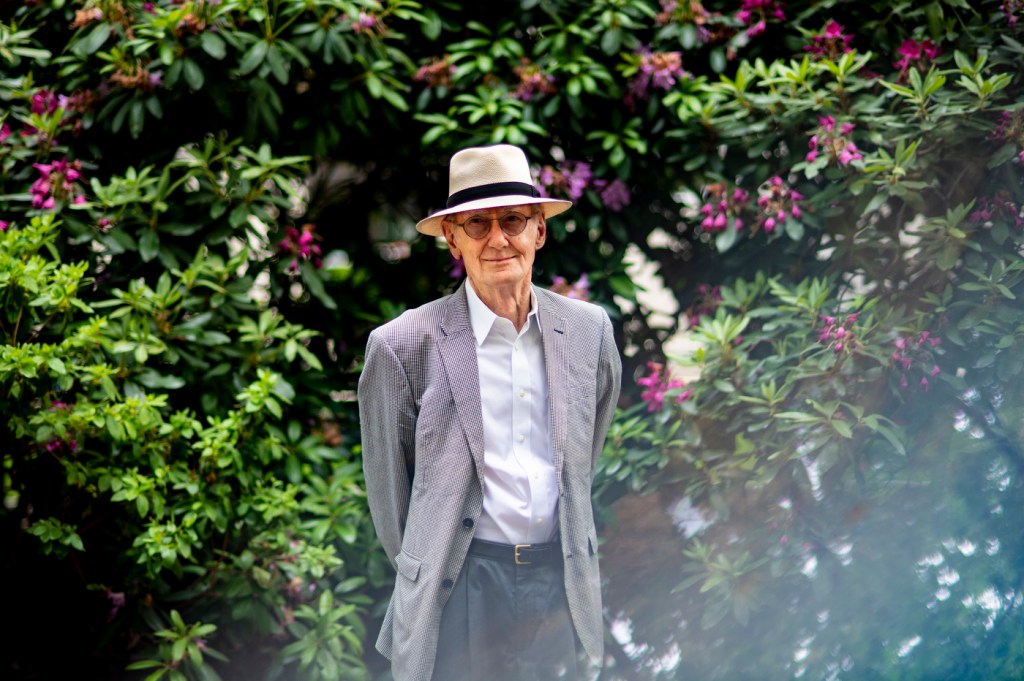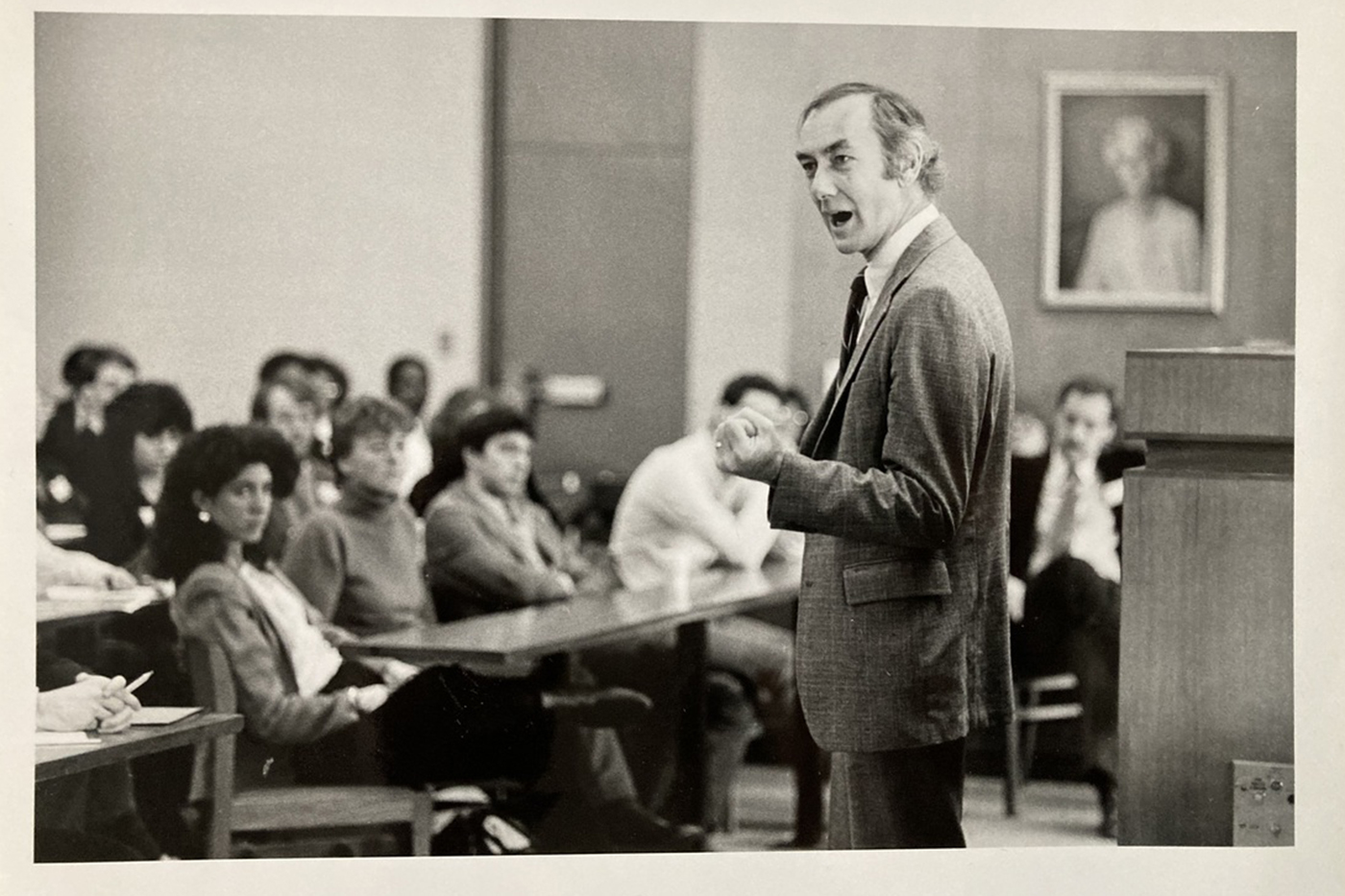How retiring Northeastern law professor James Rowan found salvation in clinical work

Northeastern School of Law is regarded as one of the top public interest law schools in the nation. And for the last 42 years, professor James Rowan has been a big reason why.
“It has been, from its origin, a magnet for many people who were interested in the narrow but real possibility of using law to support movements for social change,” said Rowan, head of the Poverty Law and Practice Clinic, who is retiring this summer.
Hands-on and public-interest-focused clinics that allow students to explore real-world social issues are a big part of Northeastern legal education, and Rowan has been at the core of the clinical program, according to his colleague and former student Margo Lindauer, clinical professor of law and director of Domestic Violence Institute.
“He has grown it and nurtured it and helped it become one of the leading programs in the country,” Lindauer said.
Rowan served as director of Clinical Programs at Northeastern until January 2020. He has been a leader in civil legal services and is beloved nationally, Lindauer said, despite his dislike of the spotlight.
Lindauer described Rowan as a very knowledgeable, patient, and kind educator, supportive and available to students.
“He is pretty sarcastic but incredibly passionate about legal services and representing individuals who need legal assistance. He is just wonderful,” Lindauer said.
Rowan has taught such courses as welfare law, poverty law and practice, trial practice, lawyering process, and professional responsibility, as well as an advanced course in criminal procedure. His personal legal interests include legal education, economic development and grassroots organizing.
Rowan, who will turn 79 on July 4, was born and raised in Brooklyn, New York. He earned his bachelor’s degree in philosophy from Georgetown University in Washington, D.C., and was inspired to become a lawyer by the civil rights movement.
“It was along with the [Vietnam] War. It was the issue of the day. It was the most obvious, most serious kind of injustice,” Rowan said.
He continued his education at Duke University School of Law, receiving juris doctorate in 1970 and master of law in 1978. After practicing civil rights law and criminal defense at a private firm in Durham, North Carolina, Rowan moved to Boston in 1978 to join the Massachusetts Law Reform Institute as a director of training.
He entered academia at Northeastern in 1980 and has not regretted it since.
“It turned out to be a way of being of service,” Rowan said. “A way of helping other people to explore how they wanted to be and what they wanted to do.”

At Northeastern, Rowan got involved in clinical work and became an expert in clinical teaching. Northeastern started its first clinical program in tandem with Harvard, Rowan said, and two pioneers of legal aid clinics–Gary Bellow of Harvard Law School and Clinton Bamberger of the Legal Services Institute.
“I owe endless gratitude to Gary Bellow and Clinton Bamberger, who were my mentors in clinical education,” Rowan said.
That first local legal services office was running in the Jamaica Plain neighborhood of Boston, trying to target patterns of injustice that the community members were experiencing.
The ideas for all subsequent clinics that Rowan was involved in arose from the needs of communities and community organizations and led to many long-term relationships. Under Rowan’s leadership, the School of Law started the Community Business Clinic, the Immigration Clinic and the Intellectual Property Clinic.
In the last decade, the most pressing issues for his clients have been economic justice issues, including unemployment and welfare, Rowan said.
“Legal advocacy frequently is learned as though we are atomistic and individually driven,” Rowan said.
However, legal clinics try to counterbalance that individualistic view, Rowan said, recognizing centrality and importance of a community in defining its own needs and objectives and working on problems collectively rather than trying to band-aid them individually.
For students, clinics provide practical, hands-on experience, not unlike medical or nursing programs, Rowan said, where they use their knowledge and skills under the supervision of a faculty member.
“The clinics give them a chance to actually practice law,” Rowan said.
At the same time, Rowan is quite humble in describing his and his students’ contribution to solving the issues the clinics have worked on.
“We were mostly supplementary,” Rowan said. “We were not carrying the load, we were providing some very specific, usually quite narrow, ancillary help.”
He credits the organizations that the clinics had assisted with doing most of the advocacy work while Northeastern students and faculty helped with specific legal needs such as legal research and writing, legislative drafting and lobbying or untangling legal twists and overcoming stumbling blocks.
Over the years, Rowan consulted such organizations as the Coalition for Basic Human Needs, Gay and Lesbian Adolescent Social Services, Chinese Progressive Association and the Union of Minority Neighborhoods.
Rowan has also been director of the Poverty Law and Practice Clinic which has represented 8,000 welfare recipients and 4,800 unemployment claimants, and preserved an estimated $20 million in income for its clients and their families since 1980.
Although many of the issues Rowan has been working on continue to persist, he has not lost hope.
“Everything that is worth doing, tends to take a long time,” Rowan said.
Besides, he believes that clinical work has offered him salvation as a lawyer.
“I view legal work as inherently dangerous,” said Rowan. “The law is a tool of oppression, a way that the powerful maintain power.”
Working with law students and aiming at equipping new advocates with understanding and tools necessary to work on individual problems while recognizing the centrality of the community in identifying and working out its own solutions allowed Rowan to do the work that he enjoyed “without doing too much damage,” he said.
Rowan and his career will be celebrated by friends and colleagues from 5:30-8 p.m. June 10 at Northeastern University Faculty Club.
He is not certain yet about what he is going to do in retirement, although he has an idea.
“I am going to make a quilt out of all my ties,” Rowan said.
For media inquiries, please contact media@northeastern.edu.
